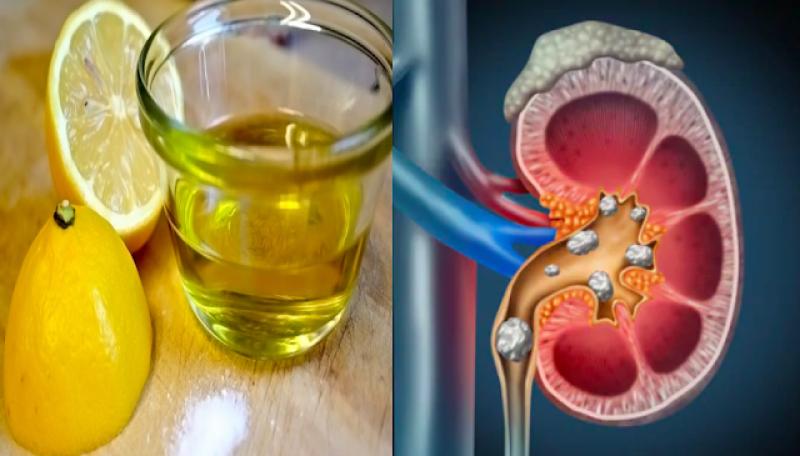How to dissolve kidney or bladder stones naturally?
Dissolving kidney or bladder stones naturally can be challenging, and it's essential to consult with a healthcare professional for proper diagnosis and guidance. Natural methods may help prevent the formation of new stones and assist in passing smaller stones, but they may not be effective for dissolving larger stones. Here are some natural methods that may be beneficial:
Hydration: Drinking plenty of water is essential to prevent the formation of stones and help flush out small stones. Aim to drink at least 8-10 glasses of water daily.
Lemon Juice: Citric acid in lemon juice can help prevent the formation of certain types of kidney stones. Squeeze fresh lemon juice into a glass of water and drink it regularly. Note that this is more of a preventive measure rather than a treatment for existing stones.
Apple Cider Vinegar: Some people use apple cider vinegar to help dissolve kidney stones. Mix 2 tablespoons of apple cider vinegar with water and consume it daily. This remedy may help, but it's not a guaranteed solution.
Dandelion Root: Dandelion root tea is believed to have diuretic properties and may help in passing smaller kidney stones. You can find dandelion root tea at health food stores.
Kidney Bean Broth: Some people suggest boiling kidney beans and then straining the liquid for consumption. This is an age-old remedy, but scientific evidence supporting its effectiveness is limited.
Pomegranate Juice: Pomegranate juice is said to be helpful in preventing kidney stones and may aid in breaking down small stones due to its acidity.
Hydrangea Root: Some herbal remedies like hydrangea root are thought to help with stone dissolution and passing. Consult with a knowledgeable herbalist before using such remedies.
Uva Ursi (Bearberry): Uva ursi is an herbal supplement that some people use for urinary tract health. It may help with mild kidney or bladder stone issues but should be used under professional guidance.
It's important to emphasize that these natural methods are not guaranteed to dissolve stones, especially if they are large or composed of certain materials. If you suspect you have kidney or bladder stones, it's essential to consult a healthcare professional for proper diagnosis and treatment. In some cases, medical intervention, such as lithotripsy or surgical removal, may be necessary to deal with larger or more stubborn stones. Natural methods should be used in conjunction with medical advice and not as a replacement for it.
1. Natural Remedies and Methods for Dissolving Kidney or Bladder Stones
While natural remedies may offer some relief from kidney or bladder stone symptoms, it's crucial to consult with a healthcare professional for proper diagnosis and treatment.
Hydration: Increasing water intake is essential for diluting urine and facilitating the passage of stones. Aim for at least 8-10 glasses of water daily.
Citrate-Rich Foods: Citrate can help prevent stone formation by binding to calcium and preventing its crystallization. Include citrus fruits, lemons, limes, oranges, and grapefruits in your diet.
Alkaline Diet: An alkaline diet can help reduce the acidity of urine, making it less conducive to stone formation. Consume plenty of fruits and vegetables, and limit acidic foods like meat, dairy, and processed foods.
Olive Oil: Olive oil may help lubricate the urinary tract and promote the passage of stones. Consume a tablespoon or two of olive oil daily.
Basil Juice: Basil juice is a natural diuretic and may help flush out stones. Drink 1-2 cups of basil juice daily.
Apple Cider Vinegar: Apple cider vinegar contains acetic acid, which may help break down kidney stones. Mix 2 tablespoons of apple cider vinegar in a glass of water and consume it daily.
2. Impact of Diet and Hydration on Urinary Stones
Both diet and hydration play a significant role in the formation and dissolution of urinary stones.
Dietary Factors: A diet rich in oxalates, salt, and animal protein can increase the risk of stone formation. Limit oxalates-rich foods like spinach, beets, and chocolate, reduce salt intake, and moderate animal protein consumption.
Hydration: Adequate hydration helps dilute urine, reducing the concentration of stone-forming substances and facilitating their passage. Aim for at least 2-3 liters of fluid daily.
3. Specific Herbs or Supplements for Kidney or Bladder Stones
Some herbs and supplements may aid in naturally eliminating kidney or bladder stones, but research is limited, and individual results may vary.
Chanca Piedra: This herb has traditionally been used to treat kidney stones. It may help break down stones and increase urine output.
Goldenrod: Goldenrod is a diuretic that may help flush out stones. It also contains anti-inflammatory properties that may help reduce pain.
Horsetail: Horsetail is a diuretic and may help prevent stone formation by increasing urine volume and reducing calcium excretion.
Potassium Citrate: This supplement may help prevent stone formation by binding to calcium and preventing its crystallization.
4. Lifestyle Changes to Prevent Recurrence of Urinary Stones
Lifestyle modifications can significantly reduce the risk of recurrent kidney or bladder stones:
Maintain a Healthy Weight: Obesity increases the risk of stone formation. Aim for a healthy weight and body mass index (BMI).
Regular Exercise: Regular physical activity helps maintain overall health and may reduce the risk of stone formation. Engage in moderate-intensity exercise for at least 30 minutes most days of the week.
Monitor Dietary Salt Intake: Excessive salt intake can contribute to stone formation. Limit salt intake to less than 2,300 milligrams per day.
5. When to Seek Medical Intervention
While natural remedies may provide some relief, it's crucial to seek medical attention if you experience severe or persistent symptoms associated with kidney or bladder stones, such as:
- Severe pain in the abdomen, flank, or groin
- Blood in the urine
- Nausea or vomiting
- Difficulty passing urine or urinary incontinence
- Fever or chills
Early diagnosis and treatment can prevent complications and promote better long-term outcomes.













